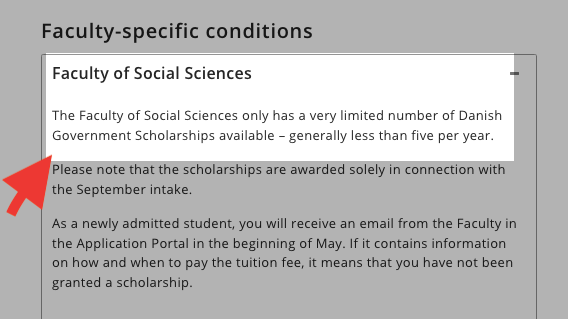To all the college pass outs this session or the graduates, you must be looking for your next educational destination, And many of you will have your sights set on Denmark. To help you in this regard, we will talk in detail about the Danish Government Scholarships that will surely make it easier for you to study in Denmark.
The quality of education in Denmark is a huge attraction for students, it ranked fifth overall in the global rankings.
Nevertheless, financial constraints are common for international students because of the high tuition fee and the expenses associated with relocation.
To neutralize this aspect, Danish government scholarships can play a huge role.
This is why we felt the urge to write a detailed guide about the subject.
So to know more about the Danish Government Scholarships for international students, their benefits, eligibility criteria, required documents, application procedure, programs offered, and the deadline, follow the article till the end!
Don’t miss the frequently asked questions in the end.
Check our detailed guide for Denmark study visas.
Danish Government Scholarships
1. Benefits of Danish Government Scholarships
2. Eligibility Criteria for Danish Government Scholarships
3. Documents Required for Danish Government Scholarships
4. How to Apply for Danish Government Scholarships?
5. Degree Level for Danish Government Scholarships
6. Deadline for Danish Government Scholarships
Want to study in Japan for free? Check our ultimate guide about MEXT scholarship Japan.
1. Benefits of Danish Government Scholarships
The Danish Government Scholarships offer two financial benefits to the students. These benefits include:
- A full tuition fee waiver
- A grant of DKK 3,000 (473 USD) will aim to cover your living costs.
This grant is not to be accounted for and you can use it in any way that you want without providing any justification.
Here is our detailed guide about Great scholarships UK.
2. Eligibility Criteria for Danish Government Scholarships
The Danish Government Scholarship is only offered to a handful of students at limited universities around Denmark.
The scholarship scheme is highly selective in choosing the awardees.
Due to this, the students have to meet rigorous eligibility criteria to stand a chance at landing the Danish Government Scholarships.
The eligibility criteria for the Danish Government Scholarship for international students are:
- Be a non-EU/EEA applicant to be eligible for the scholarship
- From a country other than Switzerland
- Must be an applicant to a full-time Master’s course in a university offering the Danish Government Scholarships
- Have a valid residence permit which shall be based on the reason for studying in Denmark
- The residence permit must be obtained at the time of admission by the Danish Aliens Consolidations Act §9c, subsection 1, under the condition that you are the child of a foreign citizen studying a higher education program in Denmark
- You will only be considered for the Danish Government Scholarships if you are not eligible for the State Educational Grant or Loan Scheme (SU)
- Must meet the admission requirements set by the university that you are applying for.
- Must not apply to an Artistic Higher Education institution
- Meet the minimum English Language Proficiency requirements set by the university that you are applying.
If you want to study in Italy for free, find out our detailed guides about DSU and EDISU scholarships.
3. Documents Required for Danish Government Scholarships
The students are required to submit various documents to be considered for admission by the relevant universities.
These universities after admission will consider you for the Danish Government Scholarships.
The documents required by universities include
3.2. Passport & National ID card
3.3. English Proficiency Proof (IELTS/TOEFL)
3.5. University admission letter
3.6. Hope certificate (If applicable)
3.8. Statement of Purpose or Motivational Letter
3.10. Proof of Previous Work Experience
3.1. Academic documents
This includes all your certificates & academic record like
A: Bachelor’s transcript & certificate
B: Master’s transcript & certificate (if the student is applying for 2nd Masters or fellowship)
C: Metric & FSC transcripts (10-12th Grade) (A level) (DMCs) and certificates (Supporting academic documents)
D: Course summary (to explain your courses & how your previous courses & studies resemble your future studies in which you are applying)
NOTE:
All of the above documents should be attested by respective boards.
Also, attest them from issuing authority of home countries. The respective university must attest university documents.
In the case of Pakistan, The above-mentioned documents must be attested by IBCC, HEC, and MOFA (Ministry of Foreign Affairs).
IBCC authority is only responsible for the attestation of metric and inter documents.
Dear offices are present in Peshawar, Karachi, Lahore, Islamabad, and also in other cities of Pakistan.
HEC office attests bachelor’s, master’s, and Ph.D. documents.
3.2. Valid passport & NIC
The passport of the applicant must contain at least one full blank page on both sides.
The passport must be valid at the time of visa application and on arrival to Denmark.
A birth certificate or national ID card is also essential to attach.
If you want to study in UK for free, find out our detailed guides about Chevening and Commonwealth scholarship.
3.3. English Proficiency proof (IELTS/TOEFL)
International students can meet English proficiency requirements by filling in one of the following criteria in the table.
However There might be extensive language requirements for some courses, but as a whole, More than 90% of Danish universities accept the given criteria.
|
English Language Proficiency Test |
Requirements |
|
IELTS Academic Test |
A minimum overall band score of 6.5 with no more than two years old at the time of application |
|
TOEFL iBT or iBT Home Edition |
A minimum score of 88 with no more than two years old at the time of application (MyBest score will not be considered) |
|
C1 Advanced (CAE) or C2 Proficiency (CPE) |
|
NOTE:
The students automatically fulfill the English language requirements if
1. They have passed English B from a Danish high school.
2. The students who have attained a diploma from an EU/EEA high school automatically meet the English language requirements. However, it is mandatory for them to provide proof of their diploma and attendance at the course.
3. Have Completed Bachelors from Canada, the USA, Australia, New Zealand, the UK, or Ireland.
3.4. Recommendation letters / Letters of References
The applicants must provide 2-3 letters of recommendation from the previous university, (Depending upon courses).
It is advised to provide a letter of recommendation from the HOD (Head of department or Relevant course head) who should be a PhD.
The referees need to write their contact details (Email, phone number) at the end of the letter.
The letter must include an official letterhead, signature, and official stamp and must be of the current date.
Ask your Referees to write about your academic achievements & discuss their confidence in you that you are fully compatible with the project or course you wish to pursue.
The referees must also mention how long they know the applicant & when was the last time they came in contact with the applicant.
3.5. University admission letter
Applicants must select a university offering courses related to their interests and background. It must be affiliated with the Danish government Scholarships.
Remember, to get a Danish government scholarship, applicants must get the admission letter first.
The acceptance letter should mention:
That the applicant is accepted to a study program at a Danish university.
The host Danish university must be approved by a state authority or by the Danish Evaluation Institute, EVA.
Check this part of the blog, where we discussed in detail how to find universities.
3.6. Hope certificate (If applicable)
If the final transcript isn’t ready then students can apply with a Hope certificate (from their university) However, they must be graduated before their arrival in Denmark.
What is Hope’s certificate?
In simple words, It is a certificate based on the previous semester’s performance, that indicates that the candidate will pass the final exams with excellent results.
3.7. Research Plan / Proposal (Optional)
Research publications/ Achievements (conference papers, article review, abstract of thesis)
The research proposal is mostly required for postdocs or Ph.D. students. (Depend upon the courses)
It asks you to write about the research project you agree upon completing with the assigned academic advisor.
Your research proposal should be a brief description of your research goals and objectives, the methods with which you wish to process that research, the outcomes you desire, the timeline and budget you have estimated, and the area of study you wish upon exploring.
It shall be a brief document yet explain the entire vision to the reader so that those analyzing your application could know of your objectives and grant you the scholarship if they match the program’s criteria and eligibility.
Taking help from an external party is strictly prohibited and violation in this regard could lead to your disqualification no matter how incredible your proposal is.
3.8. Statement of purpose or Letter of Motivation
Remember, SOP or LOM can be asked during university admission.
Technically SOP or LOM are the same things.
It’s a Short biography to tell the panelist about yourself:
Letter of motivation or SOP could be a tricky part while selecting your course in Danish universities.
In this letter, you are asked to write about your personal and professional reasons why are you applying for a course & scholarship.
The maximum length of this letter is three pages, But it is advised to make it short & concise to one page.
How to write a perfect letter of Motivation
If you are interested in writing your LOM on one page concisely, then follow this exact method.
LOM consists of three parts.
3.8.1. Introduction (one paragraph)
3.8.2. Body (3 paragraphs)
3.8.3. Conclusion (1 paragraph)
Let’s explain these three things one by one.
3.8.1. Introduction
Introduction is the gateway to the rest of the letter. Try to capture their interest in the first few sentences. Be original & creative.
Make it personal & full of enthusiasm.
TIP: Try to initiate a story about yourself relevant to the scholarship you are applying & then expand it to the first paragraph of the body.
3.8.2. Body
In the first paragraph of the body, try to tell about your relevant academic & experienced background to the course.
And your professional goals attached to the Denmark & university. Share your expectations of the scholarship.
In the 2nd paragraph be more precise & focus on the specific achievement related to the scholarship & course.
In the 3rd paragraph expand on what you are currently doing & the interesting things you look forward to.
3.8.3. Conclusion
Tell them why you are the best candidate for the Course/scholarship. Don’t sound needy or use pompous language instead focus on why you deserve it.
Tell them how this scholarship will help you or the future of your community.
3.9. Europass CV
Europass CV can be easily made here.
The Cv must contain all the latest & relevant information about your occupation & interests.
A perfect CV must be hand signed.
3.10. Experience letter
Applicant must provide an Experience letter of the previous jobs & Internships.
Try to customize the work experience letter with future studies.
Mention your job descriptions, work projects & the skills you learned through time.
The letter must be signed & verified by the Head or CEO of the company.
The work experience could be Paid,
Unpaid,
full time,
part-time or voluntary.
It could be done before, during, or after graduation.
If you want to study in Germany for free, find out our detailed guide about DAAD scholarship.
3.11. Portfolios or workshop
It’s optional. But students can attach portfolios or workshops to support their cases for university admission or scholarship.
4. How to Apply for Danish Government Scholarships?
Are you stressing over the idea of how to apply for the Danish Government Scholarships?
You don’t need to worry anymore because we will break the application procedure into small baby steps for you.
So follow the steps below to ensure that you seamlessly apply for the Danish Government Scholarship for international students:
1. Find out the list of universities offering Danish Government scholarships
2. Prepare the set of documents
3. Recheck the eligibility criteria & Apply to your desired courses
4. Take admission to university
4.1. Find out the list of universities offering Danish Government Scholarships
The first step for you is to find out the list of universities that are offering Danish Government Scholarships. This will help you narrow down your options and think more clearly about where you want to apply.
Here is a list of universities, we already prepared for you. These universities offer Danish government scholarships in various fields.
3. University of Southern Denmark (SDU)
6. Technical University of Denmark (DTU)
The students can find the rest of the programs here & look for their desired universities.
4.2. Prepare the set of documents
The documents list can vary a little according to university requirements. However, a detailed list of documents is given above. More than 90% of the universities will only require the above documents.
before considering yourself eligible, Make sure you prepare all the above documents.
4.3. Recheck the eligibility criteria & Apply to your desired courses
Check the number of scholarships in each faculty and the faculty-specific requirements of your shortlisted universities.
It is important for you to then check out if there are enough scholarships available in your faculty for you to stand a chance at getting one.
Here is an example of the number of Danish Government Scholarships being offered at the University of Copenhagen in the Faculty of Social Sciences and the specific criteria according to the faculty to land the scholarship.
Check the screenshot

The students can find many programs here & look for their desired universities.
4.4. Take admission to university
After admission in the university, if you meet all the requirements of the Danish Government Scholarships, you will be automatically considered by the university for the scholarship without filling out any application form.
You will receive an email from the university offering you the scholarship.
You have to accept or decline the scholarship by the designated deadline or else it will automatically be canceled.
Pro Tip: Check your mail and the spam folder regularly after your university admission.
Here is a detailed guide about KAIST Graduate Scholarship & Undergraduate scholarship.
5. Degree Level for Danish Government Scholarships
The students aiming to pursue a full-time degree at a higher education institution in Denmark are offered Danish Government Scholarships. These scholarships are only available for the Master’s level.
They are purely merit-based and decided by the Danish universities by reflecting on your previous academic record, discipline, and decorum.
6. Deadline for Danish Government Scholarships
There is no specific deadline for the Danish Government Scholarships since they are passed on by Danish universities.
The deadlines are set by these universities according to their admissions and session scheduling.
Generally, one session starts in February and the other in September.
The University of Southern Denmark set the application deadline for February 1 to be considered for the scholarship.
However, it will differ in other universities, and you must check the deadline at your respective university.
7. Frequently asked questions (FAQs)
Will my full tuition fee be covered through the Danish Government Scholarships?
It depends on the university you are applying to. Generally, the Danish Government Scholarships cover full tuition fees. However, some universities also offer partial tuition fee coverage through the Danish Government Scholarships. Therefore, this must be checked through your university.
How long will the Danish Government Scholarship last?
The Danish Government Scholarship does not guarantee full tuition fee coverage and the provision of a grant for both years. The provision of the scholarship is considered after the completion of your first year.
The university evaluates your academic performance and decides whether to continue your scholarship for the second year of the program.
Can I apply for Danish Government Scholarships if I live in the EU/EEA but am not a citizen?
Yes, you can apply for the Danish Government Scholarships if you are an EU/EEA resident. However, if you have citizenship of a country in that region, you will not be considered for the scholarship.
Do I need to follow any application procedure to apply for the Danish Government Scholarships?
No, there is no application procedure for the Danish Government Scholarships.
You will be automatically considered by your respective university for the scholarship.
If you are selected for the program, you will be notified by your university via email.
Is there any application fee for the Danish Government Scholarships?
No, there is no application fee for the Danish Government Scholarships. You only have to pay the application fee of your university.
How many Danish Government Scholarships are available each year?
There is a limited number of Danish Government Scholarships available each year. No specific number is provided for these scholarships. You must check out your university page to know more about the number of scholarships available in each faculty.
Can the scholarship be revoked in the middle of the year?
No, the scholarship is not revoked in between the year unless there is any unprecedented emergency that requires swift and extreme action by the university. This situation mostly arises due to disciplinary issues.
Can I use my tuition fee amount for any other purpose?
No, you will not be deposited the amount or provided the cheque. The tuition fee will automatically be deducted and you will not be liable to pay that amount. Thus, you cannot use it for any purpose.
8. Summary of the blog
- Check whether your desired university & faculty offer Danish Government scholarships or not.
- Prepare the set of documents we discussed above in detail & fulfill the eligibility criteria to get admission.
- After getting admission, the applicant will be automatically considered for the scholarship.
- The applicant will be notified through email, if get accepted. Make sure you regularly check the spam folder of your email and Wait for the result.
We try to cover each & everything, but if you still have any questions, please dont hesitate to ask.





![Scholarships in Italy for international students 2026 [UPDATED] Scholarships-in-Italy-drscholars](https://drscholars.com/wp-content/uploads/2024/09/Scholarships-in-Italy-drscholars-218x150.png)





